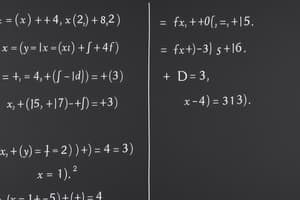Podcast
Questions and Answers
Which of the following relations represents a function?
Which of the following relations represents a function?
- {(1, 2), (3, 4), (5, 6), (1, 7)}
- {(-3, 1), (5, 2), (3, 5), (7, 6)}
- {(2, 5), (4, 6), (7, 5), (3, 9)}
- None of the above (correct)
Given the function $f(x) = 2x^2 - 3x + 1$, evaluate $f(0)$.
Given the function $f(x) = 2x^2 - 3x + 1$, evaluate $f(0)$.
1
For the function $g(x) = \sqrt{x-3}$, what is the implied domain?
For the function $g(x) = \sqrt{x-3}$, what is the implied domain?
$x \geq 3$
Which test is used to determine whether a graph represents a function?
Which test is used to determine whether a graph represents a function?
If $f(x) = 2x + 3$ and $g(x) = x^2 - 4$, find the value(s) of $x$ where $f(x) = g(x)$.
If $f(x) = 2x + 3$ and $g(x) = x^2 - 4$, find the value(s) of $x$ where $f(x) = g(x)$.
Given $f(x) = x^2 - 5x + 2$ and $g(x) = 3x - 4$, find $(f \circ g)(2)$.
Given $f(x) = x^2 - 5x + 2$ and $g(x) = 3x - 4$, find $(f \circ g)(2)$.
The function $f(x) = ax^2 + bx + c$ has roots (zeros) at $x = 2$ and $x = -3$. If $f(1) = 4$, it is possible to uniquely determine the values of a, b, and c.
The function $f(x) = ax^2 + bx + c$ has roots (zeros) at $x = 2$ and $x = -3$. If $f(1) = 4$, it is possible to uniquely determine the values of a, b, and c.
What is the domain of $f(x) = \frac{x-1}{x^2 - 4}$?
What is the domain of $f(x) = \frac{x-1}{x^2 - 4}$?
Determine the domain of the function $g(x) = \sqrt{x^2 - 9}$. Express your answer in interval notation.
Determine the domain of the function $g(x) = \sqrt{x^2 - 9}$. Express your answer in interval notation.
Match each function transformation with its corresponding effect on the graph of $f(x)$.
Match each function transformation with its corresponding effect on the graph of $f(x)$.
A shift in the graph of a function $f(x)$ to the left by $c$ units is represented by the transformation $f(x + ______)$.
A shift in the graph of a function $f(x)$ to the left by $c$ units is represented by the transformation $f(x + ______)$.
Which of the following is a key point to identify when sketching the graph of a quadratic function?
Which of the following is a key point to identify when sketching the graph of a quadratic function?
Mapping diagrams are a suitable method for visualizing functions which takes discrete inputs.
Mapping diagrams are a suitable method for visualizing functions which takes discrete inputs.
Which of the following topics should be included in a test review focused on functions and transformations?
Which of the following topics should be included in a test review focused on functions and transformations?
Name three categories into which tone and mood words can be grouped.
Name three categories into which tone and mood words can be grouped.
When analyzing a poem, ______ helps to pinpoint the specific feelings the poem conveys.
When analyzing a poem, ______ helps to pinpoint the specific feelings the poem conveys.
Which of the following should be included in the first reading when analyzing a poem?
Which of the following should be included in the first reading when analyzing a poem?
Imagery refers only to visual descriptions in a poem.
Imagery refers only to visual descriptions in a poem.
A well-structured analytical paragraph should include which of the following?
A well-structured analytical paragraph should include which of the following?
List three items covered by the multiple-choice questions in the biology section.
List three items covered by the multiple-choice questions in the biology section.
What should be labeled on a diagram of a chloroplast?
What should be labeled on a diagram of a chloroplast?
The rate of photosynthesis is unaffected by temperature.
The rate of photosynthesis is unaffected by temperature.
In a photosynthesis flowchart, what should be indicated?
In a photosynthesis flowchart, what should be indicated?
Studying key terms related to environmental protection and sustainability is part of ______ building.
Studying key terms related to environmental protection and sustainability is part of ______ building.
What framework is reviewed for source analysis in Humanities?
What framework is reviewed for source analysis in Humanities?
Flashcards
What is a function?
What is a function?
A relation where each input has only one output.
What is the domain of a function?
What is the domain of a function?
The set of all possible input values (x-values) for a function.
What is the range of a function?
What is the range of a function?
The set of all possible output values (y-values) of a function.
What is the vertical line test?
What is the vertical line test?
Signup and view all the flashcards
What is a composite function?
What is a composite function?
Signup and view all the flashcards
What are x-intercepts?
What are x-intercepts?
Signup and view all the flashcards
What are y-intercepts?
What are y-intercepts?
Signup and view all the flashcards
What is a vertex?
What is a vertex?
Signup and view all the flashcards
What is an asymptote?
What is an asymptote?
Signup and view all the flashcards
What is a mapping diagram?
What is a mapping diagram?
Signup and view all the flashcards
What are light-dependent reactions?
What are light-dependent reactions?
Signup and view all the flashcards
What is the Calvin Cycle?
What is the Calvin Cycle?
Signup and view all the flashcards
What is a chloroplast?
What is a chloroplast?
Signup and view all the flashcards
What is OPVL?
What is OPVL?
Signup and view all the flashcards
Annotate. What to annotate?
Annotate. What to annotate?
Signup and view all the flashcards
What is imagery?
What is imagery?
Signup and view all the flashcards
What is diction?
What is diction?
Signup and view all the flashcards
What are sound devices?
What are sound devices?
Signup and view all the flashcards
Study Notes
Mathematics: Functions Fundamentals
- Relations need to be determined as functions in multiple-choice questions
- Find f(2), f(-1), f(0), and f(1/2) for the function f(x) = 2x² - 3x + 1
- Identify the domain and range for g(x) = √(x-3), h(x) = 5/x, and k(x) = |2x+4| - 3
- Determine which graph passes the vertical line test, given four graphs with various relations
- Find the value of x where f(x) = g(x), with f(x) = 2x + 3 and g(x) = x² - 4
- Find (f ∘ g)(2), (g ∘ f)(1), and (f ∘ f)(-1) for f(x) = x² - 5x + 2 and g(x) = 3x - 4
- Given f(x) = ax² + bx + c has zeros at x = 2 and x = -3, and if f(1) = 4, find the values of a, b, and c, then write the function in standard form
- Identify the domain of f(x) = (x-1)/(x² - 4) and g(x) = √(x² - 9)
- Find all values of x where h(x) = |x - 2| + 3 = 5
- Sketch graphs of f(x) = x² - 6x + 8, g(x) = |x + 2| - 3, and h(x) = 1/(x-1), showing intercepts and vertices
- On a graph, identify/label the domain, range, x-intercepts, y-intercepts, and locations of any asymptotes
- Draw a mapping diagram for f(x) = 2x - 3 with the domain {-2, -1, 0, 1, 2}
- Create a sketch of f(x) = x³ and identify key features
Mathematics: Test Review
- Focus review on questions pertaining to functions and transformations
- Focus on identifying common errors
- Identify areas where points were lost
- Rework 3-5 struggled-with problems from scratch
- Compare new solutions with original answers to those problems
- Note any improvements in understanding
- Summarize key lessons learned from past errors
English: Focus on Poetry Analysis Fundamentals
- Study the list of tone and mood words
- Create flashcards for 20 unfamiliar words from the prepared list.
- Group words into categories like positive, negative, and neutral
- Practice identifying tone in short excerpts using precise vocabulary and explaining which words/phrases create that tone
- Complete a tone-mapping exercise, listing 5 specific tone words for 3 emotions (joy, grief, anger) and providing a sample phrase that would exemplify each tone
- Read Vernon Scannell's poem "Nettles," annotating for initial impressions.
- Circle unfamiliar words, underline phrases with strong imagery or emotions, and note questions/observations
- Analyze literary techniques, identifying 3-5 examples each of imagery (visual, tactile, etc.), diction (word choice), and sound devices (alliteration, assonance, etc.)
- Explain the effect that they create in the poem
- Determine the poem's theme and purpose, considering the universal human experience and the poet's intent, and analyze how the techniques support that purpose
- Connect the poem to the assigned area of focus
- Analyze how the poem relates to art/creativity, science/environment, or beliefs/values
- Practice writing an effective introduction for an analysis of "Nettles," including a hook, title/author, directional statement, and thesis
- Practice writing a PEEL paragraph about imagery, including point (topic sentence), evidence (quote), explanation (analysis), and link (to theme/purpose)
- Self-assess the writing against English assessment criteria and pinpoint one strength and one area to improve upon
Biology: Photosynthesis
- Answer 15 multiple-choice questions covering light-dependent reactions, the Calvin cycle, photosynthesis factors, the chloroplast, and cellular respiration
- Self-check answers using the provided key
- Complete a detailed diagram of a chloroplast, labeling all major structures and indicating where reactions take place
- Complete a flowchart of the photosynthesis process, filling in missing reactants, products, processes, and indicating energy transfers
- Sketch/label a graph showing the effect of light intensity, CO2 concentration, and temperature on the photosynthesis rate
- Explain the role of water in photosynthesis
- Describe how ATP is generated during light-dependent reactions
- Compare and contrast C3 and C4 photosynthesis
- Explain why photosynthesis is important for all living organisms
- Describe the adaptations of leaves for maximizing photosynthesis
Spanish: Environmental Vocabulary
- Learn 20 key terms related to environmental protection and sustainability
- Create flashcards with Spanish terms and English meanings
- Practice pronunciation of each term
- Read a passage about environmental initiatives in a Spanish-speaking country
- Answer comprehension questions about the content and identify new vocabulary
- Write 5-8 sentences about environmental issues in the community using at least 10 vocabulary terms and focusing on correct verb conjugation and sentence structure
Arabic: Reading Comprehension
- Review 15 vocabulary words related to current topics and practice using each in a sentence
- Read a one-page text on a contemporary issue
- Annotate unfamiliar words to look up meanings and identify main ideas/supporting details
- Answer 5-7 questions with complete sentences and correct grammar/structure
Humanities: Source Analysis Techniques
- Review the OPVL (Origin, Purpose, Value, Limitation) framework
- Study examples of effective source analysis
- Analyze a primary source document (historical letter, speech, image), applying the OPVL framework, and identifying potential biases and contextual factors
- Write a short paragraph analyzing the source's reliability
- Explain how the source could be used in a historical investigation
- Consider what additional sources would complement this one
Daily Review and Reflection
- Summarize what was learned in each subject
- Identify particularly challenging concepts
- Note questions to ask teachers
- Prepare study materials for the next session
Studying That Suits You
Use AI to generate personalized quizzes and flashcards to suit your learning preferences.




